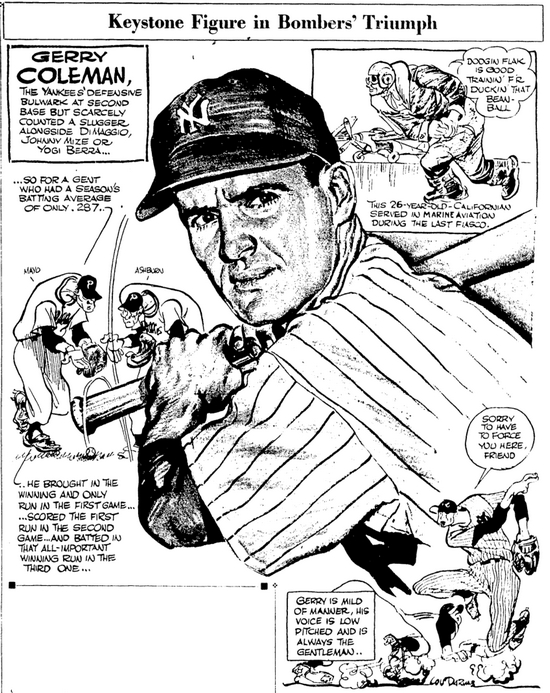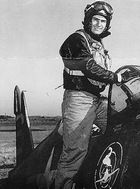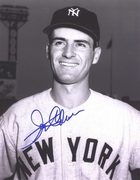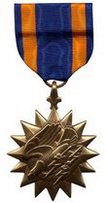Jerry Coleman
Ballplayers Decorated in Combat
| Date and Place of Birth: | September 14, 1924 San Jose, CA |
| Date and Place of Death: | January 5, 2014 La Jolla, CA |
| Baseball Experience: | Major League |
| Position: | Infield |
| Rank: | Captain |
| Military Unit: | VMSB-341 US Marine Corps |
| Area Served: | Pacific Theater of Operations |
Gerald F. "Jerry" Coleman was born on September 14, 1924, in San Jose,
California. He attended Lowell High School in San Francisco, and signed
with the New York Yankees organization, aged 17, in 1942. The
right-handed hitting infielder was assigned to the Wellsville Yankees of
the Class D PONY League his rookie year, and batted .304 in 83 games at
shortstop.
When Coleman turned 18, in September of that year, he enlisted in the
Navy as an Aviation Cadet. He joined the V-5 program at the Navy
Pre-Flight School, St. Mary's, California, where he had an opportunity
to work out with Charlie Gehringer's team. He earned his pilot's wings
on April 1, 1944, transferred to the Marine Corps, and served as a dive
bomber pilot in the Pacific, flying the two-seat Douglas SBD Dauntless,
with Marine Scout Bombing Squadron 341 (VMSB-341). Coleman was stationed
in the Solomons and the Philippines, flying 57 combat missions. He said
of the Dauntless, it was “a magnificent dive bomber, with great control
and resulting accuracy.”
When First Lieutenant Coleman returned to the United States in July
1945, he had been awarded two Distinguished Flying Crosses, along with
seven Air Medals. When the war ended, Coleman was at Marine Corps Air
Station Cherry Point, North Carolina, learning to fly the carrier-based
dive bomber Curtiss SB2C Helldiver - the replacement for the Dauntless.
Despite having missed three seasons due to military service, Coleman was
just 21 years old when he returned to the Yankees organization in 1946.
He was assigned to the Binghamton Triplets of the Class A Eastern
League, and batted a respectable .275 in 134 games. He advanced to the
Kansas City Blues of the Class AAA American Association in 1947, and
joined the Newark Bears of the Class AAA International League in 1948.
Coleman made his major league debut with the Yankees on April 20, 1949,
taking over from Snuffy Stirnweiss as the Yankees' regular second
baseman, he played 128 games and batted .275, to be named The Sporting
News’ American League Rookie of the Year. He was an all-star and World
Series MVP in 1950, but his average dropped to .249 in 1951.
Coleman missed the majority of the next two seasons when he was recalled
to military service during the Korean Conflict, and felt the recall was
justified. “Speaking only for myself, the reason seems simple enough,”
Coleman told The New York Times in 1952. “For an experienced flier, it
takes only about two months to get back in harness. Starting with a
youngster who has never flown before, it would take about two years
before he would be ready for combat duty.”
Holding the rank of captain, he flew 63 close air support missions
between January and May 1953, with Marine Attack Squadron 323 (VMA-323)
piloting a Vought AU-1 Corsair ground-attack fighter. And it was not
without incident. He averted death when an F-86 Sabre jet narrowly
missed him as they headed for the same runway. Another time, his plane
flipped over after the engine stalled during takeoff.
When Captain Coleman was discharged from military service for the second
time, he had earned a further six Air Medals. In total, Coleman received
two Distinguished Flying Crosses, 13 Air Medals and three Navy
citations.
Coleman was back with the Yankees at the tail-end of the 1954 season,
and remained with the team through 1957. After retiring from the game,
he served in the Yankees' front office. In 1960, Coleman became a
broadcaster for the CBS Radio Network, and in 1963, began a seven-year
run calling New York Yankees' games on WCBS Radio and WPIX-TV. After
broadcasting for the California Angels for two years, in 1972, Coleman
became lead radio announcer for the San Diego Padres. In 1980, he left
the booth to manage the Padres, but after the team finished last, he
returned to broadcasting.
In 2005, Coleman was given the Ford C. Frick Award by the Baseball Hall
of Fame. Named for the former baseball commissioner, it is presented
annually to a broadcaster for “major contributions to baseball.”
Jerry Coleman passed away on January 5, 2014, in a San Diego hospital,
after suffering head injuries in a fall at home a few days earlier. He
was 89 years old and is buried at Miramar National Cemetery in San
Diego.
“To me the height of my life, the best thing I ever knew," said Coleman,
"wasn’t the Yankees, wasn’t baseball or broadcasting. It was the Marine
Corps.”

Date Added January 23, 2018
Can you add more information to this biography and help make it the best online resource for this player? Contact us by email
Read Baseball's Greatest Sacrifice Through The Years - an online year-by-year account of military related deaths of ballplayers
Baseball's Greatest Sacrifice is associated with Baseball Almanac
Baseball's Greatest Sacrifice is proud to be sponsored by




